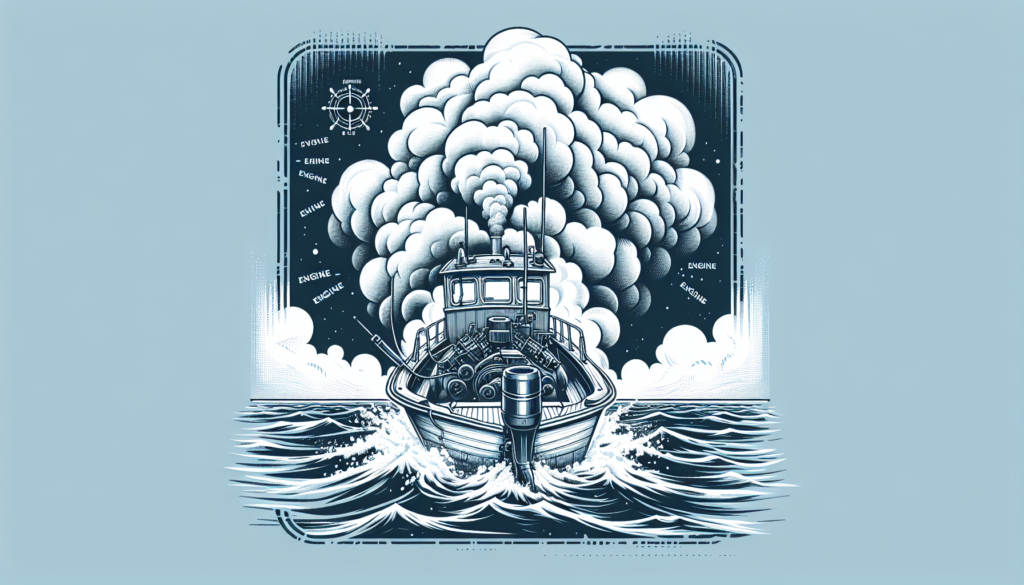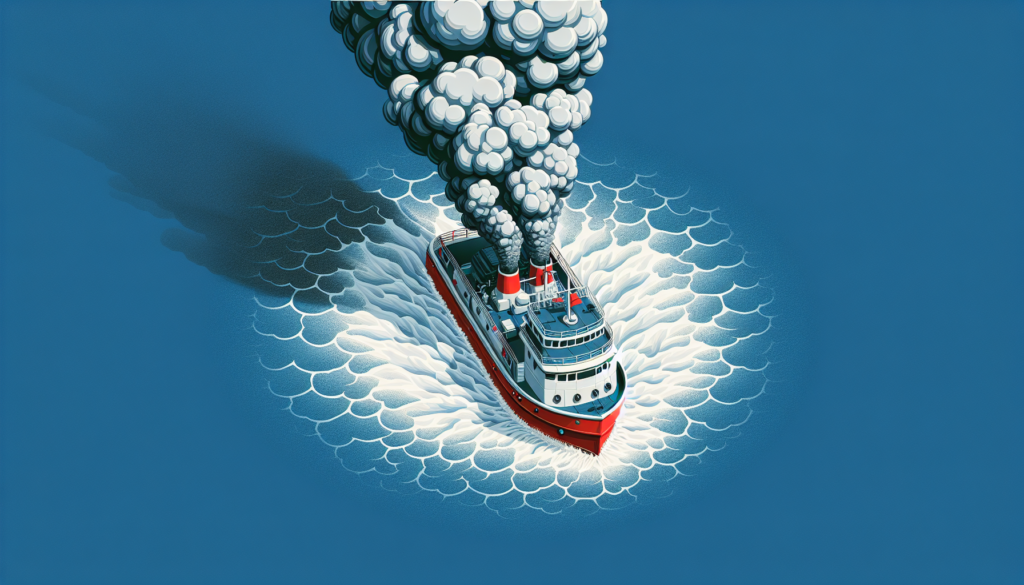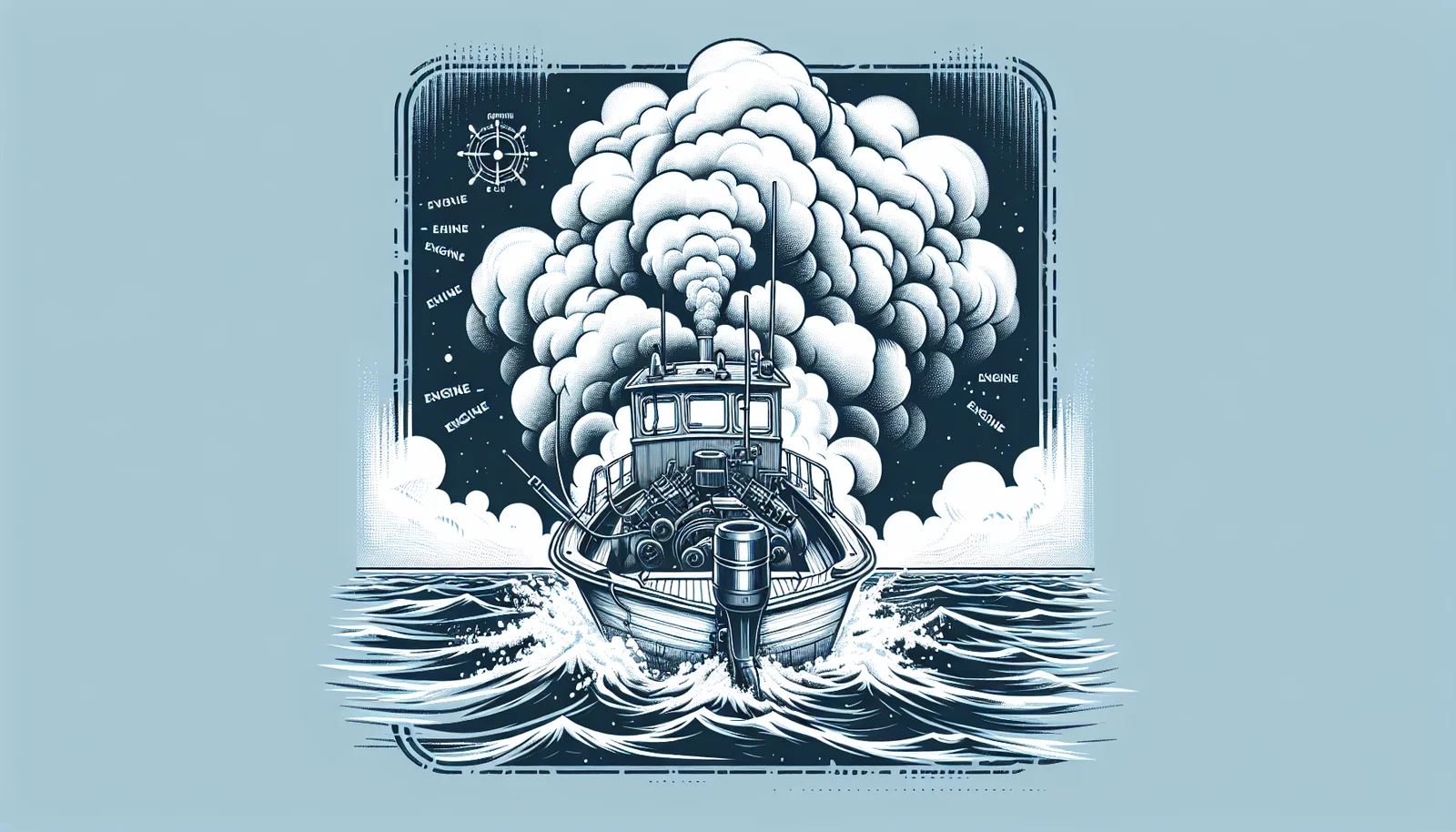Experience a billowing cloud of smoke coming from your boat engine can certainly dampen the joys of a day out on the water. Fear not! In this piece, “Why Does My Boat Engine Smoke and How to Fix It?” we’ll decode the reasons behind this disconcerting sight and equip you with practical solutions to get your trusty vessel back to its best. Get ready to learn how to diagnose and remediate this common issue without having it take a toll on your nautical adventures.

Understanding the Types of Smoke from Boat Engine
As a boat owner, it’s your responsibility to understand the various indications of potential problems with your boat engine. Since it is such a complex piece of machinery, the engine can provide a multitude of signals to indicate an underlying issue. One subtle indication of a possible issue is the color and type of smoke emitted from the engine.
Indications of White Smoke
White smoke from your boat engine can be an alarming sign. It often indicates that the coolant is leaking into the combustion chamber. Moreover, when combustion is incomplete, unburned fuel can also lead to white smoke. You need to keep in mind that thin white smoke is normal, especially in cold weather. However, If the white smoke is thick and consistent, it may indicate a serious problem and requires immediate inspection.
Identifying Blue or Gray Smoke
When your boat engine emits blue or gray smoke, it’s a clear indication that oil is being burned along with the fuel. This could signify a major problem, such as oil leaking into the combustion chamber because of worn-out or broken components. Gray smoke may also indicate a malfunctioning turbocharger. These matters can be quite complex, require expertise and thorough inspection to diagnose.
Recognizing Black Smoke
Black smoke from a boat engine is usually a sign that your engine is running incredibly rich, that is, using too much fuel and not enough air. This is often due to a clogged air filter, malfunctioning fuel injector, or a problematic carburetor. If black smoke is coming out, you’ll need to get this issue addressed right away as it can lead to additional wear and tear on your engine, if not handled appropriately.
Factors Causing Your Boat Engine to Smoke
Understanding the root cause of smoke from your boat engine can not only help you reduce unnecessary panic but can also help prevent significant damages. The major causes of boat engine smoke are discussed below.
Conditions of Overheating
Often, issues related to overheating can lead to smoke from the engine. Continuous overheating situations can possibly even cause permanent damages to the engine. It’s important to regularly check the cooling system and get it serviced periodically to prevent such issues.
Overfilling of Boat Engine Oil
Excessive oil in the engine can lead to gray or blue smoke. Overfilling the oil can cause it to get into the combustion chamber and get burned along with the fuel, creating blue or gray smoke. Always ensure to fill the correct quantity of oil recommended by the boat manufacturer to prevent any damage.
Issues with Fuel Injector
If the fuel injector of your boat is clogged or defective, it can cause the engine to start pumping out black or sometimes even white smoke. The injector’s job is to spray fuel into the combustion chamber, and if it’s not functioning correctly, it can lead to irregularities with combustion and generate smoke.
Inadequate Valve Sealing and Worn Piston Rings
The oil from the rest of the engine can leak into the combustion chamber, leading to blue smoke if the valves are not properly sealed or the piston rings have worn out. It is strongly recommended to get these parts replaced or repaired as soon as an issue is detected to prevent further damages.
Low Quality Fuel Utilization
The use of low-quality fuel can cause numerous problems, including engine smoking. Inadequate fuel can lead to incomplete combustion creating smoke and even causing damage to different parts of the engine.
Diagnosing Overheating Problems
Engine overheating problems are quite common in boats, especially during hot summers. Below are the primary reasons causing overheating and how you can identify them.
Coolant Deficiency
Having an insufficient amount of coolant in the system can replicate the symptoms of overheating. Regularly checking and refilling the coolant can prevent sudden overheating issues in boat engines.
Faulty Thermostat
A faulty thermostat can prevent the flow of coolant to the engine, causing it to overheat. Inspect the thermostat if you encounter repeated overheating problems with your boat engine.
Dysfunction of Water Pump
The water pump is responsible for circulating the coolant throughout the engine. If the pump is not functioning properly, it can lead to overheating. Regular inspection and servicing can avoid these issues.
Corroded Heat Exchangers
Corrosion is a common issue in heat exchangers of boats, which can block the flow of coolant, thus causing the engine to overheat. Regular cleaning and maintenance can help prevent this.

Checking the Oil Status in Your Boat Engine
The condition and quality of engine oil play a significant role in the smooth functioning of the engine.
Determining Overfilled Oil
Monitoring the oil level is fundamental to avoid any excessive oil issues. Overfilled oil can lead to smoke from the boat engine.
Analyzing the Quality and Condition of Oil
The quality of oil in your boat engine can have a direct impact on its performance. Regularly and properly analyze the quality and condition of the oil.
Confirming Oil Leakages
Periodically checking for any oil leaks is crucial. Leakage can lead to low oil levels, thereby causing the engine to produce smoke.
Inspecting Fuel Injector and Fuel Quality
Quality of fuel and the functioning of the fuel injector significantly affect the performance of the boat engine.
Identifying Signs of Defective Fuel Injector
A defective fuel injector can lead to excessive fuel consumption and generate smoke. Knowing the signs and having it promptly checked can save the engine from major damage.
Recognizing the Impacts of Low-Quality Fuel
Using low-quality fuel can lead to countless problems in any engine. Recognizing its impact will help you understand the importance of using good quality fuel.
Recommendations for Fuel Types and Brands
Not every type of fuel is suitable for your boat. Get the proper recommendations for fuel types and brands from professionals to derive maximum performance from your engine.
Highlighting the Importance of Regular Engine Maintenance
Regular maintenance of your boat engine significantly reduces the chance of encountering any major issues.
Regular Inspection and Servicing
Regular inspection and servicing are essential for the smooth functioning and longevity of the engine.
Periodic Oil Change
Change the oil of your boat engine periodically to maintain its excellent performance.
Timely Replacement of Worn Out Components
Timely replacement of worn-out components can prevent further damage and improve the overall life of the engine.
Step-by-Step Guide to Fixing an Overheated Boat Engine
Overheating of the boat engine is a common issue. Here are few step by step guidelines to address this problem.
How to Refill Coolant in Boat Engine
Learn how to refill the coolant to avoid sudden overheating situations.
Replacing a Faulty Thermostat
Understanding the steps to replace a faulty thermostat can help prevent the engine from continuous overheating.
Fixing or Replacing a Damaged Water Pump
Knowing how to repair and replace a damaged water pump will prove beneficial for you in maintaining the engine performance.
Cleaning or Replacing Corroded Heat Exchangers
Cleaning or replacing corroded heat exchangers regularly can prevent any blockages and maintain a steady flow of coolant.
Steps to Correct an Overfilled or Low-Quality Oil Issue
Overfilled or low-quality oil can cause smoke and damage to the boat engine. Follow these steps to correct these issues.
Procedure to Level Out Overfilled Oil
Know the procedure to level out overfilled oil and prevent any additional damage to the engine.
Guideline to Changing Engine Oil
Regularly change the engine oil following these guidelines to ensure the smooth function of the engine.
How to Select Suitable Oil for Your Boat Engine
Selecting suitable oil for your boat engine is of paramount importance. This section will guide you in choosing the right oil.
Addressing Issues with Fuel Injector and Fuel Quality
Fuel injector and fuel quality issues can majorly impact the boat engine’s performance. Here are tips to address these problems.
Tips to Clean a Clogged Fuel Injector
Learning tips to clean a clogged fuel injector can help maintain the engine’s fuel consumption balance.
How to Change Low-Quality Fuel
Low-quality fuel can produce smoke and damage engine components. Know how to replace low-quality fuel with a higher grade one.
Indications You Need to Replace Your Fuel Injector
Continuous problems even after cleaning the fuel injector might indicate a need for replacement. Understand these indications clearly.
Importance of Seeking Professional Help
Complex issues with your engine need professional attention. Do not shy away from seeking professional help whenever necessary.
When to Consult an Expert
Recognizing the right time to consult an expert is important. Understand the indications which call for professional help.
Understanding Limits of DIY Fixes
There might tasks which are beyond your skills. Understand the limits of DIY fixes and do not hesitate to seek expert assistance.
Impact of Professional Servicing on Longevity of Boat Engine
Regular professional servicing can significantly impact the longevity and performance of the boat engine. Never undermine the importance of expert servicing.

